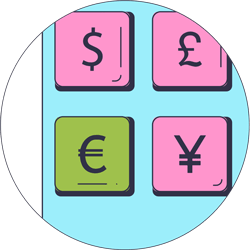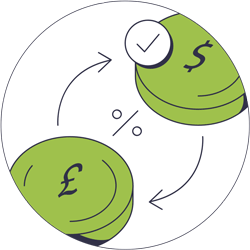- |
- Business
- Compare Exchange Rates
- |
- |
- Reviews
- |
- Help
- |
- Contact Us
- |
- Blogs
- |
- Currency Converter


Most banks and bureaux de change add on various margins to the British Pound to Turkish Lira exchange rate that customers are not aware of making it harder for you to compare exchange rates on offer. We have gone one step further. To offer you low-cost exchange rates on your travel money whilst giving you access to the live interbank exchange rate for GBP/TRY at the point of when you transact for complete transparency. Compare our currency exchange rates and see how much you could save. So, if you are looking for the best place to buy Turkish Lira, then you are at the right place.

Ranked 1st of 96 on Review Centre

I have British Pounds
 GBP
GBP 1 GBP = Your exchange rate
1 GBP = Real exchange rate
The more you order the lower the fee
I want to buy


Last updated on
Source: compareholidaymoney.com
I have British Pounds
 GBP
GBP

I want to buy

| You Sell | Exchange rate | You Get (After fees) |
You could save | |
|---|---|---|---|---|
*We capture the exchange rates being offered by airports and high street providers once a month and calculate what spread they are taking off the live interbank rate. We then compare that to what rates we are offering to calculate the savings you can make if you use us.
*Your potential saving has been calculated using our exchange rate and the most expensive provider's rate in the market at a given point in time.



Log in to your account or visit the home page and select the currency Turkish Lira and confirm the amount you wish to buy





Our Turkish Lira rates move with the market, once you confirm your order we fix your rate


Royal Mail will require a signature from someone in the property at the time of delivery





Pay via bank transfer or credit, debit cards. We can only dispatch Turkish Lira currency once we have received cleared funds


We shall email you a dispatch notification once your Turkish Lira currency is on its way to you and this mail will include your tracking details.



We use Royal Mail Special Delivery which is a fully insured and secure home delivery service

Most providers in the UK will quote the rate of exchange as a rate directly from the interbank rate or real exchange rate, therefore it will be displayed as £1 gets you x Turkish Lira. Therefore the higher the exchange rate, the more Turkish lira that you will receive.
Not only can they it work out more expensive, but most providers on the high street including bureau de change and airport operators do not always stock Turkish Lira in branch so its always sensible to obtain the best pound to lira rate with the lowest fees by ordering your travel money online.
Always check with your provider that they are giving you the best value. The Currency Club charges a lower fee with the more that you order.So, converting Pounds to Turkish Lira becomes easier and pocket-friendly.
Exchanging British Pounds for the Turkish Lira is not a challenging affair anymore. With The Currency Club's advanced currency exchange system, you can now get any international currency that you need by simply ordering it online. So, no more hassle of running to the exchange bureaus, and filling out lengthy paperwork before your travel.
Most providers include their margin within the rate of exchange. We think that at the point you transact, where you do not have reference to the interbank exchange rate can lead to significant variation within these margins being offered when buying currency. The Currency Club will always provide you with access to the real interbank exchange rate when you buy Turkish Lira and we show our offered exchange rate clearly so you can make an informed decision and compare accordingly.
The Turkish lira is the currency of Turkey and the independent state of the Turkish Republic of Northern Cyprus. In 1926, the Ministry of Finance introduced notes for the Republic of Turkey in denominations of 1, 5, 10, 50, 100, 500 and 1000 lira. These were the last notes printed with both French and Turkish text on them.
All notes and coins of Turkish Lira have portraits of Mustafa Kemal Ataturk from different points of his life since 1930s on the front side. The new Turkish lira was introduced on 1 January, 2005, replacing the previous lira which remained valid in circulation until the end of 2005 at a rate of 1 new lira = 1,000,000 old lira, a transition period for the removal of six zeroes from the Turkish lira currency. The older symbol for Turkish lira was YTL and posts the currency transition; the ISO (International Organization for Standardization) 4217 code for Turkish Lira is now "TRY".
From 1970, Turkey experienced chronic inflation and throughout the 1990s a series of hard, then soft pegs to the dollar operated as the value of the lira began to fall. The Guinness Book of Records ranked the lira as the world's least valuable currency in 1995 and 1996, and again in 1999 through 2004.
Turkish Lira Notes: 5, 10, 20, 50, 100 and 200
Kurus coins: 5, 10, 25 and 50
You can order up to £7500 worth of Turkish Lira but providers generally do not set a maximum limit. Any amount above £7500 would be delivered in separate packages on following days.
Like they say never say never, but online operators will always have lower overheads than the high street. Always make sure you compare the pound lira exchange rates wherever you decide to purchase your Turkish Lira as many providers will charge commission or hide their fees within the rate of exchange. The Currency Club will always give you the real exchange rate with our small fee shown separately.
The Turkish lira is the one of the currencies that we get asked about the most during the summer, and the one question that trumps the others, is "When is the best time to buy Turkish Lira?"
Firstly, no one has a crystal ball and the pound to Turkish Lira is extremely volatile. The exchange rate swings as much as a couple of percentage points every day.
One thing for sure is that over the years, Turkey has become one of the biggest destinations for tourism with its stunning beaches and fascinating history and culture.
Over the past few years, the GBP/TRY movements have been all the more significant due to ongoing political and economic conditions in Turkey. It was not too long ago in 2018 when Turkey's currency and debt crisis began. The Turkish lira plunged in value as the economy suffered from high inflation and rising costs of borrowing due to loan defaults. From the 1st February 2018 to the 1st August 2018, the pound to Turkish lira rate had fallen by as much as 71% over the period with highs hitting above 9 Turkish lira to the pound!
The Turkish lira began to recover towards the end of 2018 as the central bank of Turkey intervened with staged stimulus and increases in the base interest rate.
Just when we thought the pound to Turkish lira rate could not get any higher, it has reached all time highs once again in 2020. As of writing this piece, the rate is currently above 10.50 Turkish Liras to the pound. Could this be the perfect time to plan a holiday to Turkey?
This is a staggering difference for holiday makers and those transferring money to Turkey.
Although many companies provide forecasts and predictions, nobody knows the perfect time to buy the Turkish Lira. Many thought the best time was going to be in 2018 when the financial crisis was at its peak, but soon enough, the Covid Pandemic has hit the planet, and we are rising above the dizzy highs of where were before at the worst point in 2018. When it comes to travel, Turkey may be one of the best value destinations to visit in 2021. Only time will tell.
If so please visit Sterling FX for exceptional in branch Turkish Lira rates - www.sterlingfx.co.uk/london-branch
As of approximately, September 2021, the population of Turkey stood at approximately 84 million people. Given the data is out of date this may have significantly changed.
In Turkey, there is a Touristic Environment Tax that is charged if you are staying in hotels, motels, hostels, pensions, holiday villages, and camping areas. The amount of the tax varies depending on the type and the category of the accommodation, as well as how long you are staying for.
1) For 5-star hotels: 3.50 TL (approximately 0.41 USD) per person per night
2) For 4-star hotels: 2.50 TL (approximately 0.29 USD) per person per night
3) For 3-star hotels: 2.00 TL (approximately 0.23 USD) per person per night
4) For 2-star hotels and below, as well as other types of accommodation: 1.50 TL (approximately 0.17 USD) per person per night
Please note that these are subject to change so always check with the place where you are staying beforehand.
1. Restaurants: A sensible tip of 10-15% of the total bill at restaurants is a good idea. Some restaurants may include a service charge in the bill, so it's always check before leaving a tip.
2. Cafes: You can leave a small tip of 1-2 Turkish Lira for a cup of coffee or tea.
3. Taxis: its not common to tip taxi drivers, but you can round up the fare to the nearest whole number.
4. Hotel staff: Many leave a small tip for hotel staff who provide good service, such as housekeeping or bellhops. A tip of 5-10 Turkish Lira per day is sensible.
5. Tour guides: If you take a guided tour, usually it's a good idea to tip the guide at the end of the tour. A tip of 10-20 Turkish Lira per person is appropriate, depending on the length and quality of the tour.
Remember these are just general guidelines and tipping practices can vary depending on the situation and your personal preference.
1. Antalya: Located on Turkey's Mediterranean coast, Antalya is home to several popular beach resorts, including Lara Beach and Konyaalti Beach. These beaches offer crystal-clear waters and lots of water sports and beach time activities.
2. Bodrum: Bodrum, located on the Aegean Sea, is a popular beach destination for both tourists and locals. Bodrum is home to several beautiful beaches, including Gumbet Beach, Bitez Beach, and Turkbuku Beach.
3. Fethiye: Fethiye, located on the southwestern coast of Turkey, is home to several stunning beaches, including Oludeniz Beach, Calis Beach, and Butterfly Valley. These beaches offer clear waters and magnificent views.
4. Cesme: Cesme, located on the western coast of Turkey, is known for its beautiful beaches and thermal springs. Some of the most popular beaches in Cesme include Ilica Beach and Altinkum Beach.
5. Alanya: Alanya, located on Turkey's southern coast, is a popular beach destination for families. Some of the most popular beaches in Alanya include Cleopatra Beach and Damlatas Beach.
There are also many other beaches and resorts worth visiting which are not mentioned here. This is just a snapshot of some popular locations when visiting Turkey.
1. Mosques and religious sites: When visiting mosques or other religious sites, make sure you dress modestly and cover your head, arms, and legs. Women are usually required to wear a headscarf, and men are required to remove their shoes.
2. City streets and public places: In more urban or touristic areas, clothing is generally more relaxed, but it's still important to dress modestly.
3. Beaches and resorts: Beachwear is usually acceptable at beaches and resorts, but it's a good idea to cover up when leaving the beach or resort area.
4. Business settings: In business settings, formal or business clothing is the norm.
Overall, it's important to be respectful of local customs and traditions when it comes to dress code in Turkey. In Turkey, dressing modestly and conservatively is generally respected and shows admiration for local culture.
The key religion in Turkey is Islam, which is practiced by the almost all of the population. According to official statistics, approximately 99% of the population identifies as Muslim, with many following the Sunni branch of Islam. However, Turkey identifies itself as a secular country, and its constitution guarantees freedom of religion and belief for all inhabitants. Other religious communities in Turkey include Jews, Christians and other faiths.
Turkey is not currently a member of the European Union (EU). Turkey has been trying to join the EU since the 1980s and at one point recognised as an official candidate for membership since 1999. Turkey has not met all the requirements for membership yet and this has exacerbated the delays. There are also political and economic issues that have significantly hindered the progress of the negotiations. Nonetheless, Turkey continues to remain an important strategic partner for the EU, and the two parties continue to maintain close political and economic relations.
The call to prayer, known as "ezan" in Turkish, is a daily announcement made from mosques to inform Muslims of the time for prayer. In Turkey, the call to prayer is made five times a day, as follows:
1. Sabah (Dawn): The first call to prayer is made when dawn breaks, usually between 4:30 am and 5:00 am, depending on the season.
2. Őğle (Noon): The second call to prayer is made at noon, usually around 12:30 pm.
3. İkindi (Afternoon): The third call to prayer is made around 3:30 pm.
4. Akşam (Evening): The fourth call to prayer is made around 6:30 pm.
5. Yatsı (Night): The final call to prayer is made at night, usually around 9:00 pm.
The exact timing of the call to prayer depends on the location and the time of year. Also note that during the holy month of Ramadan, the timing of the call to prayer may be different, with more calls made during the early morning hours for the "sahur" meal before the day's fasting begins.
1. Shops: Most shops in Turkey are open from Monday to Saturday, usually from 9:00 am to 7:00 pm. Some shops may close for a few hours in the afternoon for a lunch break, especially in smaller towns and villages. On Sundays, many shops are closed, especially outside of tourist areas.
2. Restaurants: Restaurants in Turkey tend to be open later when compared to shops, especially in touristic areas. Many restaurants are open throughout the day, from breakfast until late at night. In general, lunch is served between 12:00 pm and 2:00 pm, and dinner is served from around 7:00 pm until late.
Check the date when you are travelling because if you travel during the holy month of Ramadan, the opening and closing times of shops and restaurants may change. Many establishments close during the day and open later in the evening. It's also a good idea to check with the shop or restaurant for their opening and closing times, as they may vary change based on the season, location and other specific reasons.
Day 1-2: Istanbul - Spend two full days exploring the vibrant city of Istanbul, visiting famous landmarks such as the Hagia Sophia, the Blue Mosque, and the Grand Bazaar. Take a Bosphorus cruise and enjoy some traditional Turkish food.
Day 3-4: Cappadocia - Fly to the stunning region of Cappadocia, famous for its unique landscape of rock formations and underground cities. Take a hot air balloon ride for a bird's eye view of the region, and explore the Goreme Open Air Museum and the Kaymakli Underground City.
Day 5-6: Antalya - Fly to the coastal city of Antalya, known for its stunning beaches and ancient ruins. Spend time relaxing on the beach or take a boat tour along the coastline. Visit the ancient city of Perge, the Roman amphitheater in Aspendos, and the Duden Waterfalls.
Day 7: Pamukkale - Take a day trip to the stunning white terraces of Pamukkale, a UNESCO World Heritage site. Explore the ancient city of Hierapolis and soak in the natural hot springs.
1. Public transportation: Turkey has a great network of buses and trains that connect cities and towns. Buses are usually the most affordable solution, with frequent departures and reasonable fees. Many cities also have local buses and trams that offer low-cost transportation within the city.
2. Shared taxis: Shared taxis, called "dolmus" are a popular way to travel between smaller towns and villages. These taxis follow certain routes and pick up passengers along the way, so they're a great way to save money on transportation.
3. Walking and cycling: Walking or cycling can be an affordable and enjoyable way to explore Turkey's cities and countryside. Many cities have designated bike lanes and pedestrian areas, making it easy to get around on foot or by bike.
4. Carpooling: If you're traveling longer distances, carpooling can be a cheaper option. Websites and apps like BlaBlaCar connect drivers with passengers who are traveling in the same direction, allowing you to share the cost of travel.
Overall, public transport and shared taxis are usually the most inexpensive ways to get around Turkey, but the best option will depend on your itinerary and preferences. The taxi fare from the airport to the main beach resorts in Turkey can differ depending on the distance and location of the resort. As an estimate, a taxi ride from Antalya Airport to the popular beach resort of Lara Beach can cost around 60-80 Turkish Lira (TL), which is roughly $7-9 USD. Whereas, a taxi ride from Dalaman Airport to the resort town of Marmaris can cost around 200-250 TL, which is approximately $23-29 USD.
However, it's important to note that taxi fares can vary depend based on the time of day, the availability of taxis, and other factors, so it's always a good idea to confirm the fare with the taxi driver before starting your trip. Additionally, some resorts offer shuttle services or private transfers from the airport, which may be a more convenient and cost-effective option.
1. Age: The minimum age for renting a car in Turkey is usually 21 years old, but some rental companies may require drivers to be at least 25 years old.
2. Driver's License: You'll need a valid driver's license from your home country, as well as an International Driving Permit (IDP). The IDP is a translation of your driver's license into multiple languages and is required by law in Turkey.
3. Credit Card: You'll need a credit card in your name to rent a car in Turkey. The rental company will place a hold on your card for the amount of the rental, as well as any additional fees or charges.
4. Insurance: You should have insurance when renting a car in Turkey. Most rental companies will offer their own insurance options, but you can also purchase insurance from third-party companies.
5. Additional Requirements: Some rental firms may require additional documents, such as a passport. Make sure you check with the rental company before you arrive to ensure that you have all the necessary documents.
It's always a good idea to check with the rental company in advance to ensure that you have all the necessary documents and to confirm their specific needs.
Overall, public transport and shared taxis are usually the most inexpensive ways to get around Turkey, but the best option will depend on your itinerary and preferences. The taxi fare from the airport to the main beach resorts in Turkey can differ depending on the distance and location of the resort. As an estimate, a taxi ride from Antalya Airport to the popular beach resort of Lara Beach can cost around 60-80 Turkish Lira (TL), which is roughly $7-9 USD. Whereas, a taxi ride from Dalaman Airport to the resort town of Marmaris can cost around 200-250 TL, which is approximately $23-29 USD.
However, it's important to note that taxi fares can vary depend based on the time of day, the availability of taxis, and other factors, so it's always a good idea to confirm the fare with the taxi driver before starting your trip. Additionally, some resorts offer shuttle services or private transfers from the airport, which may be a more convenient and cost-effective option.
1. Kebabs: Turkey is famous for its grilled meat, especially doner kebab, shish kebab, and Adana kebab. These dishes are usually made with lamb or chicken and are often served with bread, rice, or vegetables.
2. Meze: Meze is a selection of small dishes served as appetizers or side dishes. Popular meze dishes include hummus, tzatziki, stuffed vine leaves, and fried eggplant.
3. Baklava: Baklava is a sweet pastry made of layers of phyllo dough filled with chopped nuts and sweetened with honey or syrup. It's a popular dessert in Turkey and is often served with Turkish coffee or tea.
4. Pide: Pide is a type of Turkish pizza made with a boat-shaped flatbread and various toppings, such as cheese, meat, or vegetables.
5. Lahmacun: Lahmacun is a thin, crispy flatbread topped with minced meat, vegetables, and spices. It's often served with lemon juice and parsley.
6. Dolma: Dolma is a dish made of stuffed vegetables, such as peppers, tomatoes, or eggplants, filled with rice, herbs, and spices.
7. Bőrek: Bőrek is a pastry filled with cheese, spinach, or meat. It's often eaten as a snack or for breakfast.
These are just a few examples of the many delightful local foods you can try when visiting Turkey. Each region of Turkey has its own specialties and flavours, so be sure to explore the local cuisine wherever you go.
1. Turkish tea: Turkish tea, or çay, is a black tea that is brewed in a special teapot called a çaydanlık. It's often served in small tulip-shaped glasses and is a staple drink in Turkey.
2. Turkish coffee: Turkish coffee, or Tűrk kahvesi, is a strong, thick coffee that is brewed in a small copper pot called a cezve. It's usually served in small cups and often comes with a small sweet treat like Turkish delight.
3. Ayran: Ayran is a refreshing yogurt drink that is popular in Turkey. It's made by mixing yogurt, water, and salt and is often served with grilled meats or as a separate drink.
4. Şalgam: Şalgam is a fermented sour and salty drink made from turnips, beets, and carrots. It's often served with kebabs or other grilled meats
5. Rakı : Rakı is the drink of celebrations in Turkey. A strong anise-flavored alcoholic drink that is often served with meze.
6. Salep: Salep is a hot drink made from the powdered root of a wild orchid. It's mixed with hot milk, sugar, and cinnamon and is usually served during the winter months.
Make sure you explore the local beverage culture when visiting Turkey, as there are many unique and delicious drinks to try.
1. Cirit: Cirit is like the equivalent of Turkish polo. It's played on horseback, with two teams trying to score points by throwing wooden javelins at each other.
2. Mangala: Mangala is a popular board game that is played throughout Turkey. It's a bit like mancala, but with some variations in the rules and gameplay.
3. Okey: Okey is a tile-based game that is similar to rummy. It's played with a set of 106 tiles and is popular among both younger and older individuals.
4. Tavla: Tavla, is backgammon. It is a popular board game that is played throughout Turkey. It's played with two dice and a set of 30 checkers, and is often seen being played in cafes and other social areas.
5. Yagli Gures: Yagli Gures, also known as oil wrestling, is a traditional Turkish sport that dates back centuries. It's a form of wrestling where both opponents rub olive oil over themselves before engaging in a wrestle. It is still popular in rural areas of Turkey.
If you're interested in learning more about the games and sports placed in Turkey then pop into one of the many cultural centers and organizations throughout Turkey that offer classes and workshops.


The currency code for Turkish Lira is TRY.
The symbol for Turkish Lira is ŧ
Exchange rates of the US dollar depend widely as they are usually priced off the interbank exchange rate of the US dollar. This can be found widely online through foreign exchange information providers such as Oanda and Xe. You can then find deliverable exchange rates of the US dollar from banks, bureau de change and currency exchanges globally.
It is generally advised to use Turkish Lira when transacting in Turkey, however US dollars and euros are widely accepted in some tourist areas. It can also be more expensive in certain places to transact in Euros and US Dollars compared to Turkish Lira but always check against the live interbank exchange rate before transacting.
You can exchange your currency for Turkish Lira at banks, bureau de change and currency exchange offices, or via an ATMs in Turkey. Just be aware of all the charges involved when converting currency. Keep an eye on transaction fees, commissions if payable and percentages off the live interbank exchange rate in advance of conducting an exchange.
There are currently restrictions on taking Turkish Lira out of the country. You can only take up to 5,000 Turkish Lira out without providing proof of how you received the currency.
Yes, credit cards are widely accepted in Turkey, particularly in larger cities and tourist areas. However, it's always a good idea to have some cash on hand as many businesses do not accept credit cards due to the additional fees that they cost to process.


